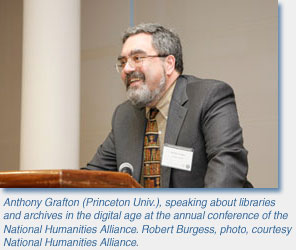 On March 3 and 4, 2008, 145 members of the humanities community, including college and university teachers, museum professionals, librarians, archivists, and independent scholars, gathered in Washington, D.C., for the 2008 national conference of the National Humanities Alliance (NHA), of which the AHA is a member. The highlight of the conference was the ninth annual Humanities Advocacy Day. Ninety-four participants fanned out across Capitol Hill to visit 127 House and Senate offices to urge support for federal agencies that sustain research, education, public programs, and preservation in history and other fields. Participants in the congressional visits learned to be effective advocates at Monday policy briefings. They returned from the Hill energized and excited by the opportunity they had to persuade their elected leaders of the critical national importance of scholarship and public programs in the humanities.
On March 3 and 4, 2008, 145 members of the humanities community, including college and university teachers, museum professionals, librarians, archivists, and independent scholars, gathered in Washington, D.C., for the 2008 national conference of the National Humanities Alliance (NHA), of which the AHA is a member. The highlight of the conference was the ninth annual Humanities Advocacy Day. Ninety-four participants fanned out across Capitol Hill to visit 127 House and Senate offices to urge support for federal agencies that sustain research, education, public programs, and preservation in history and other fields. Participants in the congressional visits learned to be effective advocates at Monday policy briefings. They returned from the Hill energized and excited by the opportunity they had to persuade their elected leaders of the critical national importance of scholarship and public programs in the humanities.
The conference closed with a reception at the Sewall-Belmont House and Museum at which the NHA presented its Sidney R. Yates Award for Distinguished Public Service to the Humanities to the Honorable Norman D. Dicks (D-Wash.), the chair of the House Interior Appropriations Subcommittee, for his ongoing support for the National Endowment for the Humanities, as well as the National Endowment for the Arts and other cultural resources. Dicks said that he continually reminds his congressional colleagues that “the small investment we were making in these important entities would produce results all over the country” in practically every congressional district. He swore to enthusiastic applause that he is “never going to be satisfied until we have an administration that will take this budget back to where it should be.”
A policy forum on Monday morning offered participants an opportunity to brainstorm priorities for the NHA’s National Agenda for the Humanities. NHA Executive Director Jessica Jones Irons announced the results of a survey that asked NHA members to identify critical issues facing the humanities; funding, sustaining scholarship, and emphasizing the importance of humanities education emerged as key concerns. Participants broke into small discussion groups to offer feedback on unmet challenges and needs, and potential strategies for addressing those issues, in key areas such as scholarship, education, and the humanities and the public. Following the policy forum, a second roundtable gave attendees a chance to rotate among tables staffed by over 30 representatives of federal agencies to hear more about programs at the National Endowment for the Humanities, Library of Congress, National Archives and Records Administration, National Park Service, Institute of Museum and Library Services, Department of Education, and several others. A breakout session focused on current policy issues affecting historians and federal support for history. Another covered problems with travel and visa policy that are affecting international scholarly exchange.
Anthony Grafton of Princeton University (a former vice president of the AHA’s Professional Division) gave a rousing and witty address on the future of libraries and archives in the digital age. Grafton argued that computers and the Web have transformed reading and scholarship more dramatically than any development since the printing press, but that there are many paradoxes in this development. The digital revolution has vastly increased access to documents for scholars all over the world, particularly those in countries that formerly had little access to quality libraries and archives. Material formerly confined to a few libraries or a single archival collection is now “available to everybody like a vast humanistic Bat Signal.” Yet only a small percentage of resources have been digitized, and there is a marked bias toward recent and Western records, particularly in commercial projects. The ideal that digital information should be free fails to take into account the costs of refereeing, formulating, and editing content. If these scholarly apparatuses are not supported, we risk being inundated with “everybody’s first thoughts.” Libraries and archives that do not embrace new technology risk becoming “ghost ships” of lovingly preserved paper records that no one ever consults. Yet those who go too far in the opposite direction risk becoming “Starbucks,” an Internet café where users browse through an endless array of unfiltered content.
The conference left participants better informed about the challenges and opportunities facing the humanities, and energized to advocate for continued federal funding for the programs that sustain the field.

